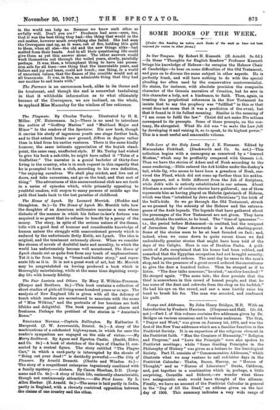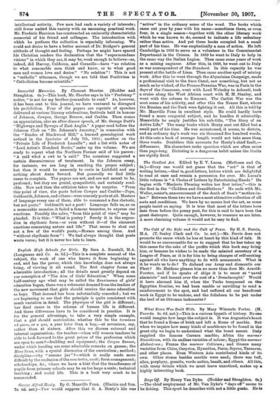Essays and Addresses. By John Henry Bridges, M.B. With an
Introduction by Frederic Harrison. (Chapman and Hall. 12s. 61 net.)—Part I. of this volume contains five addresses given by Dr. Bridges on various occasions and to various audiences. The first, "Prayer and Work," was given on January 1st, 1879, and was the first of the New Year addresses which are a familiar function in the Positivist Society. It is an exposition of the religious element in the Positivist faith. " Man the Creature of Humanity," " Religion and Progress," and "Love the Principle" were also spoken to Positivist meetings ; while "Some Guiding Principles in the Philosophy of History " was given as a lecture to the Sociological Society. Part II. consists of "Commemorative Addresses," which illustrate what we may venture to call red-letter days in the Positivist Calendar : Thales, Bacon, Harvey, as " Heroes of Thought," and as "Heroes of Literature" Dante, Calderon, and, put together in a combination which is, perhaps, a little surprising, Corneille and Diderot,—we wonder what those two antagonistic souls would have thought of the alliance. Finally, we have an account of the Positivist Calendar in general in the " Day of All the Dead," an address given on the last day of 1906. This summary indicates a very wide range of intellectual activity. Few men had such a variety of interests ; still fewer united this variety with an unceasing practical work. Mr. Frederic Harrison has constructed an eminently characteristic memorial of his friend and colleague. The introduction with which he prefaces the collection is especially informing. We could not desire to have a better account of Dr. Bridges's general attitude of thought and feeling. Perhaps he might have spared his Christian readers the declaration that the "supermundaue visions" in which they are, it may be, weak enough to believe—as, indeed, did Harvey, Calderon, and Corneille—have "no relation to what reasonable men think and know, or to what good men and women love and desire." "No relation" ! This is not a "catholic" utterance, though we are told that Positivism is " Catholicism become scientific."



















































 Previous page
Previous page